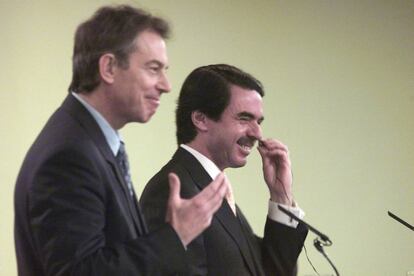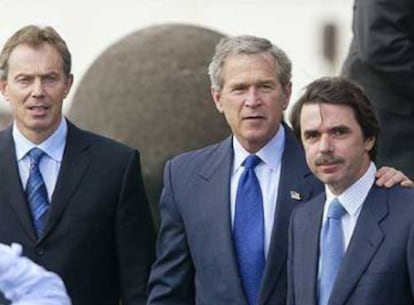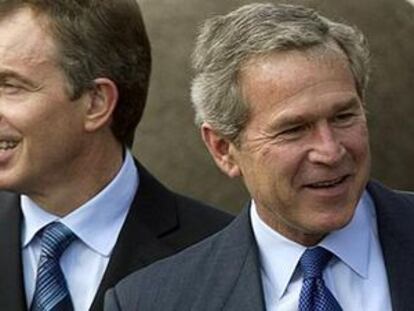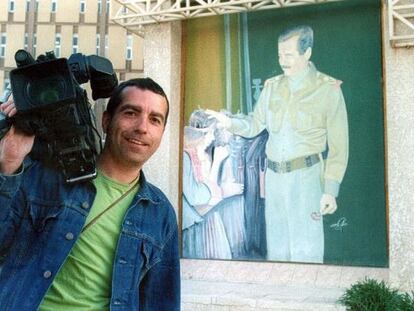Aznar and Blair agreed on joint Iraq war communications strategy
The Chilcot Report shows former Spanish leader tried to help secure backing from UN Security Council to make the invasion seem legal to the public


An in-depth inquiry into the invasion of Iraq shows how British and Spanish leaders deliberately tried to convince the public that they were “doing everything possible to avoid war.”
Former British Prime Minister Tony Blair and his Spanish counterpart at the time, José María Aznar of the Popular Party (PP), agreed to launch a communications strategy at a meeting in Madrid.
The Chilcot report, named after inquiry chairman Sir John Chilcot, provides a comprehensive view of events leading up to the decision to go to war, and of the fallout resulting from that move.
Aznar used his influence over Latin America to pressure Chile and Mexico, who also held rotating seats at the Security Council
Blair and Aznar were very concerned about the difficulty posed by the widespread impression that the United States was “determined to go to war no matter what.”
Aznar told Blair that he was worried about this after meeting with then-US president George W. Bush, in whom he saw “an excess of confidence.”
In fact, Blair and Aznar did not do everything in their power to avoid a war or convince Bush to cancel his plans. Instead, they made efforts to provide the invasion with an appearance of legality by trying to secure a second resolution from the United Nations Security Council — the first one, passed in November 2002, was not worded in strong enough terms.
The Chilcot report contains numerous references to Aznar. But despite the famous photograph of him alongside Blair and Bush in the Azores islands, Spain does not come across as playing a leading role in the decision-making. Rather, the Spanish former leader emerges as a sidekick to Bush.
Sign up for our newsletter
EL PAÍS English Edition has launched a weekly newsletter. Sign up today to receive a selection of our best stories in your inbox every Saturday morning. For full details about how to subscribe, click here.
It was the fact that France and Germany rejected going to war, and the coinciding circumstance that Spain had a non-permanent seat on the Security Council at the time, that allowed Aznar to briefly shine on the international stage.
But his star waned after his Popular Party suffered a defeat at the general elections of March 2004, which took place right after Islamist bomb attacks against commuter trains in Madrid.
A new resolution
At a first meeting in Madrid on January 30, 2003, Blair told Aznar that a new UN resolution was required because public opinion was increasingly opposed to an invasion of Iraq. Both men agreed to work towards that goal.
“Mr Blair told Mr Aznar that he had told President Bush that a second resolution was politically necessary for the UK,” reads the report. “Mr Blair and Mr Aznar discussed the impact of a veto on the UN and, therefore, the need to avoid one; and whether it would be better to seek a second resolution in mid – rather than late February. [...] Mr Blair acknowledged that public opinion was moving against military action but suggested it could be brought round.”
Aznar used his influence over Latin America to pressure Chile and Mexico, who also held rotating seats at the Security Council, although he was unsuccessful.

The British report also notes that if Bush agreed to delay the invasion until March, it was not because he felt the need for UN backing, but because his own military experts warned him that they were not quite ready to move in yet.
In mid-March, Aznar gave up on his efforts to drum up support for a second resolution, and told Blair it was better not to propose one if its approval could not be guaranteed – which it was not.
At the Azores meeting on March 16, Bush, Blair and Aznar agreed that, barring any substantial changes in the next 24 hours, the UN option was finished. In public, however, they presented their ultimatum as “one last chance for peace.”
“Mr Blair stated that the role of the UN in post-conflict Iraq must be defined very carefully: ‘We must give the impression that the administration was under UN authority. The clearer the UN role, the better. It was vital that UK public opinion understood that we were not taking possession of Iraq’s oil,” reads the report.
On April 23, a month after the invasion, when everyone was asking about the weapons of mass destruction, Bush, Blair and Aznar agreed to say that finding them was no longer a priority.
Unlike the first two leaders, Aznar never apologized for that war.
“You cannot ask a friend [Bush] for help, and then, when he asks you for help in return, deny it,” he has said by way of explanation.
English version by Susana Urra.
Tu suscripción se está usando en otro dispositivo
¿Quieres añadir otro usuario a tu suscripción?
Si continúas leyendo en este dispositivo, no se podrá leer en el otro.
FlechaTu suscripción se está usando en otro dispositivo y solo puedes acceder a EL PAÍS desde un dispositivo a la vez.
Si quieres compartir tu cuenta, cambia tu suscripción a la modalidad Premium, así podrás añadir otro usuario. Cada uno accederá con su propia cuenta de email, lo que os permitirá personalizar vuestra experiencia en EL PAÍS.
En el caso de no saber quién está usando tu cuenta, te recomendamos cambiar tu contraseña aquí.
Si decides continuar compartiendo tu cuenta, este mensaje se mostrará en tu dispositivo y en el de la otra persona que está usando tu cuenta de forma indefinida, afectando a tu experiencia de lectura. Puedes consultar aquí los términos y condiciones de la suscripción digital.









































